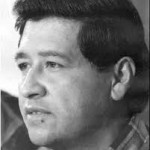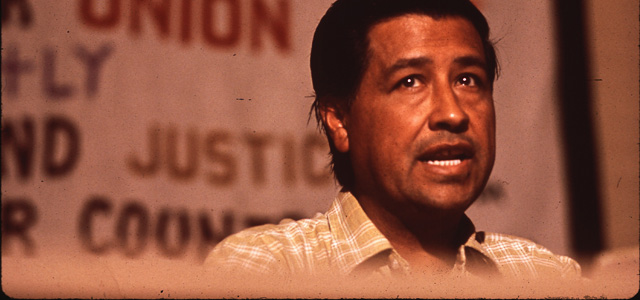 Cesar Chavez was a Mexican-American labor leader and the founder of the National Farm Workers Association (NFWA). The NFWA was the first union of farm workers in America. Chavez said, “From the depth of need and despair, people can work together, can organize themselves to solve their own problems and fill their own needs with dignity and strength.”[1] At the age of 15, Cesar realized that farm owners and contractors exploited migrant farm workers and he spoke out on behalf of the workers for higher wages and better working conditions, even as some of the workers did not share his views because they did not want to lose their jobs.[2] However, in 1970, Chavez was imprisoned for about 20 days at the Monterey County Jail for refusing to end lettuce boycotts against Salinas Valley.[3] Chavez and the United Farm Workers Organizing Committee (UFWOC) had embarked on a strike in support of better working conditions for lettuce migrant workers.
Cesar Chavez was a Mexican-American labor leader and the founder of the National Farm Workers Association (NFWA). The NFWA was the first union of farm workers in America. Chavez said, “From the depth of need and despair, people can work together, can organize themselves to solve their own problems and fill their own needs with dignity and strength.”[1] At the age of 15, Cesar realized that farm owners and contractors exploited migrant farm workers and he spoke out on behalf of the workers for higher wages and better working conditions, even as some of the workers did not share his views because they did not want to lose their jobs.[2] However, in 1970, Chavez was imprisoned for about 20 days at the Monterey County Jail for refusing to end lettuce boycotts against Salinas Valley.[3] Chavez and the United Farm Workers Organizing Committee (UFWOC) had embarked on a strike in support of better working conditions for lettuce migrant workers.
The Monterey County Jail was a three-story building which held male prisoners. Chavez’s imprisonment attracted sympathy from a lot of his followers and he was visited in prison by the wives of Martin Luther King Jr and Robert Kennedy: Coretta Scott King and Ethel Kennedy. Many celebrities stopped coming to Salinas after Chavez was released, and by 1980 the Monterey County Jail was no longer used to hold and imprison inmates. According to Chavez,“You cannot uneducate the person who has learned to read. You cannot humiliate the person who feels pride. And you cannot oppress the people who are not afraid anymore”.[4] Chavez was credited as the first leader to speak out for justice for farm workers who had been neglected for a very long time. [5] Robert Kennedy described Cesar as “one of the heroic figures of out time.”[6]
Chavez had a turbulent upbringing, but because of his vision and foresight thousands of migrant farm workers’ lives were improved and their communities were made safer.[7] The Chavez family was a poor migrant farm-worker family; they did not have permanent homes because they traveled often picking seasonal fruits and vegetables. Migrant workers’ wages were low, they worked under very difficult conditions, and they did not have bathrooms, electricity and running water. It was acknowledged that the migrant nature of Cesar’s parents affected his early education because the family was always moving. Cesar attended 30 different elementary schools and he left school at the age of 15 to become a migrant farm worker, so that he could help to support his family after his father was injured in a car accident. For the young generation, Chavez said “Students must have initiative; they should not be mere imitators. They must learn to think and act for themselves and be free.” [8]
Chavez was motivated by the work of St. Francis of Assisi and Mohandas K. Gandhi. He devoted himself to helping the poor through non-violence. He emulated the non-violence approach; he used strikes, boycotts, pickets, fasts, and marches to lead farm workers through years of struggle to win better working conditions for farm workers. Chavez maintained that “in some cases non-violence requires more militancy than violence.”[9] He also added that our lives are all that really belong to us and it is how we use our lives that determine what kind of men we are. Cesar in his lifetime did not own a car or a house; he dedicated his life and struggle to fighting for the poor migrant farm workers.[10] Martin Luther King Jr., in a letter in support of Cesar’s struggle, said “Our separate struggles are really one. A struggle for freedom, for dignity, and for humanity.”[11] Cesar was honored with the Aztec Eagle, Mexico’s highest civilian award given to people of Mexican heritage who make major contributions outside of Mexico. Cesar also received the Presidential Medal of Freedom. He was the second Mexican to receive the award from an American president. The Cesar E. Chavez Foundation has also been set up to promote the civil rights ideals of Cesar E. Chavez.
[1] “On Charity As a Form of Protest – Moderate Majority,” accessed December 30, 2013, http://www.moderatemajorityusa.org/on_charity_as_a_form_of_protest.
[2] “IMA Hero: Cesar E. Chavez Biography,” accessed December 22, 2013, http://www.imahero.com/is/bios/cesarchavez.html.
[3] “Cesar Chavez a Forgotten Memory?,” accessed December 22, 2013, http://cesarchavez93.wordpress.com/.
[4] “Marxist education:Education by Freire,” accessed December 30, 2013, http://tx.cpusa.org/school/classics/freire.htm.
[5] “Honoring César Chávez .. Could Be an Opportunity for Reparation. Sí Se Puede ‘Yes, We Can’ | The Culture Zone,” accessed December 22, 2013, http://www.theculturezone.com/faith/honoring-cesar-chavez-could-be-an-opportunity-for-reparation-si-se-puede-yes-we-can.
[6] “Honoring César Chávez .. Could Be an Opportunity for Reparation. Sí Se Puede ‘Yes, We Can’ | The Culture Zone,” accessed December 22, 2013, http://www.theculturezone.com/faith/honoring-cesar-chavez-could-be-an-opportunity-for-reparation-si-se-puede-yes-we-can.
[7] I“Honoring César Chávez .. Could Be an Opportunity for Reparation. Sí Se Puede ‘Yes, We Can’ | The Culture Zone,” accessed December 22, 2013, http://www.theculturezone.com/faith/honoring-cesar-chavez-could-be-an-opportunity-for-reparation-si-se-puede-yes-we-can.
[8] I“Honoring César Chávez .. Could Be an Opportunity for Reparation. Sí Se Puede ‘Yes, We Can’ | The Culture Zone,” accessed December 22, 2013, http://www.theculturezone.com/faith/honoring-cesar-chavez-could-be-an-opportunity-for-reparation-si-se-puede-yes-we-can.
[9] “In Some Cases Non-Violence … by Cesar Chavez, an American Activist | GoodQuotes.com,” accessed December 30, 2013, http://www.goodquotes.com/quote/cesar-chavez/in-some-cases-non-violence-requires-mo.
[10] “IMA Hero: Cesar E. Chavez Biography,” accessed December 22, 2013, http://www.imahero.com/is/bios/cesarchavez.html.
[11] “Dr. Martin Luther King, Jr.’s Legacy: Human Dignity and Respect for All,” accessed December 30, 2013, http://www.seiu.org/2013/04/dr-martin-luther-kings-legacy-human-dignity-and-re.php.


Chavez is a great example of how one person, regardless of his or her roots or his or her profession, can stand up and make the world a better place through love, compassion, non-violence and hard-work. Though he came from humble beginnings, he would help lead the “salad bowl strike,” one of the largest labor protests in US history that would eventually lead to new state and federal laws that helped field laborers. Chavez said, “We can choose to use our lives for others to bring about a better and more just world for our children. People who make that choice will know hardship and sacrifice. But if you give yourself totally to the non-violence struggle for peace and justice you also find that people give you their hearts and you will never go hungry and never be alone. And in giving of yourself you will discover a whole new life full of meaning and love.”